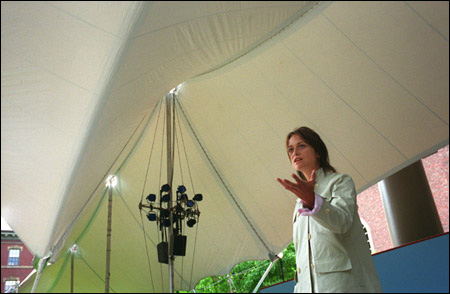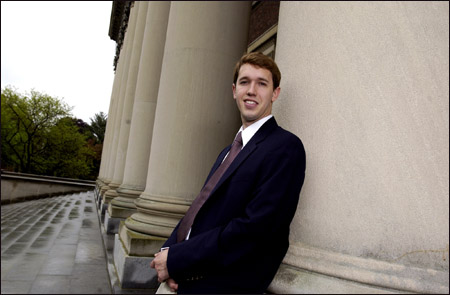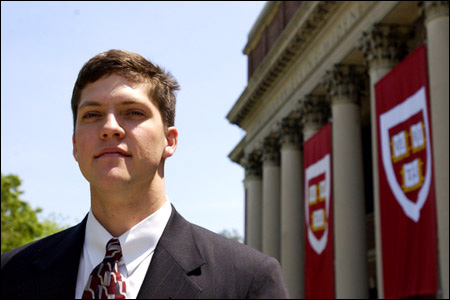Meet the student Commencement speakers:
They join centuries-old tradition

The selection of three graduating students to deliver Commencement orations is one of the oldest customs of Harvard’s tradition-rich Commencement Ceremonies. Its origins hearken back the medieval university, when students publicly defended their academic work before their tutors.
In more recent years, students have competed before a committee for the honor of delivering an undergraduate oration, an oration by a student of a graduate school, and a Latin oration to the more than 30,000 who assemble in Tercentenary Theatre Commencement morning. This year’s speakers, chosen by committee members the Rev. Peter J. Gomes, Plummer Professor of Christian Morals, Professor of Greek and Latin Richard F. Thomas, and Gurney Professor of English Literature James Engell, will bring 21st century relevance to an ancient practice.

Charles Watson, Latin Oration
Charles Watson ’03, a classics concentrator from Currier House, has set his sights on delivering the Latin oration since he came to Harvard.
He describes his speech, called “De Ignotis” (“On the Forgotten”) as a contemplation on the many important figures who are not remembered in history books or memorialized on buildings.
“I say that perhaps the most important people for the people who are graduating . . . are the people who came through hard times and who did a little bit extra to make things better for posterity. It’s because of their sacrifice that we can be here today,” he says.
The Columbia, S.C., native was inspired in part by his own forebears: His great-grandmother was an orphan, his grandfather worked in a cotton mill for 30 years. He admits that the speech is more serious than other Latin orations, which tend to be light.
Watson has studied Latin for nine years, and this spring, he produced a play – the Roman comedy “Menaechmi” – partly in Latin. Yet this is the first original Latin speech he’s delivered.
He acknowledges the challenge of speaking to an audience in a language that most of them do not understand.
“I have to communicate using more of my expressions, gestures, intonation,” he says.
Watson hopes his love of Latin – he’s drawn to the challenge of it and the beauty of the texts he’s studied – may infect the audience, as well.
“There’s something just fascinating about giving an oration in Latin,” he says.

Eric Hart, Undergraduate English Oration
Eric Hart ’03 was inspired in part by the controversy over last year’s Commencement speech by Zayed Yasin ’02 to pen this year’s winning undergraduate speech, called “Respecting the Future.”
“It’s about maintaining civility in public discourse,” says the Eliot House government concentrator and self-described conservative who grew up on a farm in Connell, Wash.
While his Harvard years have mellowed his political views somewhat, they have also brought to light what he sees as a disturbing phenomenon.
“I’ve come to realize that sometimes debate and discussion here really get out of hand,” he says. The controversy over the original title of Yasin’s speech, “American Jihad,” was largely unfounded, Hart says, and exemplifies the kind of polarized discussion he hopes to discourage.
“I’m trying to challenge myself and others as well to keep a level of respect in how we approach one another,” says Hart. “Everybody can change, but condemning rather than trying to convince is not the most effective way of going about it.”
Hart has been the music director of the Harvard-Radcliffe Veritones, the co-chair of Eliot’s house committee, and active in the Catholic Students Association, but his public speaking skills have not been tested since high school. He was prodded to compete for the Commencement oration honors in part by his mother and in part because it gave him an opportunity to synthesize the past four years for himself.
“I figured it was worth spending four hours to write a speech,” he says. “I would have spent the same four hours watching ‘The Matrix’ for the 60th time.”
Now practicing and continuing to fine-tune his speech, the immensity of his oratory duties is sinking in.
“It’s daunting,” he says. “In that theatre there are going to be about 10 times more people than live in my city.”
Elizabeth Carpenter, Graduate English Oration
Elizabeth “Lea” Carpenter, who will deliver the graduate student oration, calls herself an anomaly among her Harvard Business School (HBS) colleagues. The Princeton graduate came to HBS from the world of words; she was an editor of Zoetrope, the literary magazine founded by Francis Coppola, and had been a “lowly intern” for George magazine.
Her speech, titled “Auden and the Little Things,” reflects her love of literature by drawing its inspiration, in part, from W.H. Auden’s poem “Musée des Beaux Arts.”
“It’s a speech about how little things always happen with big things acting as distractions,” she says.
“It’s kind of a love song to the academic experience, which for me was really lovely. It allows you a very commendable retreat from a lot of other painful things that can be going on around the world,” she adds.
Carpenter was flattered, surprised, and perplexed at being chosen to speak, claiming she has no idea why her words struck the selection committee as profound. In rehearsing and memorizing her speech, however, she’s probing its wider meaning so that she can broadcast that to the Tercentenary Theatre throng.
“I was a very unlikely candidate for the Business School,” she says. “The irony of me being a mouthpiece for that School and that community is quite rich and thick, but I’m trying to embrace it.”
Carpenter jokes that her preparation for delivering the speech, which she hopes her six siblings will be able to witness, includes “lots of yoga.”
“I’m hugely accident-prone, so now I’m at high risk of tripping on the podium,” she says.




